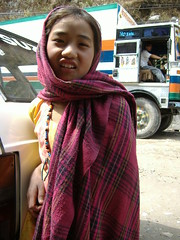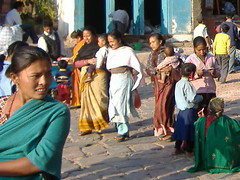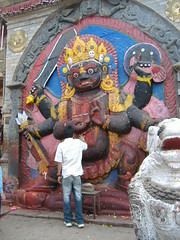Trekking and Rebellions in the Himalaya
I haven't said anything about trekking in the Annapurnas. Days away from anywhere, staring at sunrise at snowpeaks. Watching the King's publicity tour of his country - one of the 40 poorest countries in the world - by helicopter. This is a man who does not understand spin*.

About the fantastical range of different faces and races and cultures you find in Nepal - that the caste system's rules have ensured survive unadapted by miscegenation. The morphing of India into China. That the word for no is 'chhina'.

Because, thanks to Tibet, Nepal by now has become for me the place where people are helpful, where food tastes of things, where rules can be bent to accommodate you, where people enjoy life, where the sun shines, where there are systems that don't leave you inchoate with rage and threatening to cut an officials' throat if he doesn't stop lying to you. I went back to Nepal for four days (free visa!) and ... ate steak.
Three details about Nepal:
1. (*)Four british MPs visited Kathmandu to try to persuade him to abandon the dictatorship and adopt democracy a fortnight ago. Not only did King Gyanendra - famously supposed by ordinary Nepalis to have wiped out his entire family in a massacre - refuse to speak to them, he flew to Vienna and presented them with three nepali rhinoceroses. You can see the spoiled dictator's thought bubble in action - what will make the people love me? I know! Rhinoceroses!

2. Last week Prachandra's Maoist rebels declared a ceasefire, and it sounds as though the king doesn't have much luck left to draw upon, as they've declared an alliance with the other opposition parties, and called off the blockades. This is all at least in part the result of some majorly clever maneouvring on the part of both India and the US ambassador to Nepal. You don't often hear much good spoken about US foreign policy. But this guy has just - probably - saved a few thousand lives.
3. Politically, each side is as bad as the other, and the hard working Nepali people are cauight inbetween one corrupt force or another. A week earlier, Maoist rebels bombed a school where a kid's school exam was taking place. Critics pointed out that the king's army had earlier that month air bombed another school they suspected of being a meeting place for rebels. Meanwhile a woman was sentenced to twelve years in gaol for killing a cow.
And if you can solve that one, you can solve the riddle of the third world.

About the fantastical range of different faces and races and cultures you find in Nepal - that the caste system's rules have ensured survive unadapted by miscegenation. The morphing of India into China. That the word for no is 'chhina'.

Because, thanks to Tibet, Nepal by now has become for me the place where people are helpful, where food tastes of things, where rules can be bent to accommodate you, where people enjoy life, where the sun shines, where there are systems that don't leave you inchoate with rage and threatening to cut an officials' throat if he doesn't stop lying to you. I went back to Nepal for four days (free visa!) and ... ate steak.
Three details about Nepal:
1. (*)Four british MPs visited Kathmandu to try to persuade him to abandon the dictatorship and adopt democracy a fortnight ago. Not only did King Gyanendra - famously supposed by ordinary Nepalis to have wiped out his entire family in a massacre - refuse to speak to them, he flew to Vienna and presented them with three nepali rhinoceroses. You can see the spoiled dictator's thought bubble in action - what will make the people love me? I know! Rhinoceroses!

2. Last week Prachandra's Maoist rebels declared a ceasefire, and it sounds as though the king doesn't have much luck left to draw upon, as they've declared an alliance with the other opposition parties, and called off the blockades. This is all at least in part the result of some majorly clever maneouvring on the part of both India and the US ambassador to Nepal. You don't often hear much good spoken about US foreign policy. But this guy has just - probably - saved a few thousand lives.
3. Politically, each side is as bad as the other, and the hard working Nepali people are cauight inbetween one corrupt force or another. A week earlier, Maoist rebels bombed a school where a kid's school exam was taking place. Critics pointed out that the king's army had earlier that month air bombed another school they suspected of being a meeting place for rebels. Meanwhile a woman was sentenced to twelve years in gaol for killing a cow.
And if you can solve that one, you can solve the riddle of the third world.

0 Advice:
Publicar un comentario
<< Home